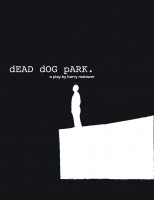‘dEAD dOG pARK,’ A Riveting Play that Invites Us To Decide

By Bill Primavera
In “dEAD dOG pARK,” the riveting play by Yorktown resident Barry Malawer that opened on March 2 to a packed house at the Philipstown Depot Theatre, there are many questions asked and none answered. And that’s what gives the play its focus as audience members are engaged to make their own decisions.
Is the white cop who is accused of pushing a black 13-year-old boy out of a 4th story window a racist and a bad cop? Or, is he a good cop who wanted only to save the boy from falling? Why did his wife leave him? Is the cop being honest when he says he really doesn’t remember whether he pushed the boy? And is the boy, who survives the fall, honest in claiming that he doesn’t remember either?
The cop is seeking his own truth, but is he sincere in that? Why did his partner request a different partner three years before the incident? Does the lawyer who acts much in the Johnnie Cochran vein use this event to assume greater symbolism than should be attached to it?
Is the boy’s mother protecting her son or fighting to assure him a windfall in a settlement? Here we have our one hint: We suspect her motives are good as she corrects everyone sharply and repeatedly when they refer to her son as “the boy” rather than by his given name, Tyler.
Just as the characters ask the questions, we ask the questions too. While each character is well defined, the audience must always question their honesty and motivation
While following the exposition of this play through rough language, anguish and damned good acting by every character, there is not a moment for the mind to wonder. It’s too needed to fill in the blanks.
The one leap of faith we must take is when a jury finds McDonald guilty without a shadow of a doubt when the prosecution falls short of making its case in the questions it asks of the cop, his wife, his partner and Tyler’s mother. There is an eyewitness, but we really don’t know what he saw or what he said. Other than that, it’s all circumstantial evidence.
But the true message here, whether we believe that the cop is a hero or villain, is that we can always hope there will be redemption, not knowing whether or not he really pushed the boy.
The most compelling scene is a two-part scenario where, after McDonald spends 12 years in jail, he returns to the scene of the crime and invites Tyler to join him there. Tyler, now a young adult appears first as a punk with no redeeming value who has squandered all the reward money. When the scene is replayed, Tyler returns as a responsible citizen who will study to be a lawyer. Which scene is fantasy in McDonald’s mind and which is reality? We get to decide.
And in the fade-out ending, with McDonald standing on the sill of the window, is he surveying the scene to determine what happened? Or does he jump? The scene fades to black leaving us to make that decision.
McDonald as played by Rick Apicella in as intense as is the writing of this piece. He is always almost over the top, but not quite, as he realizes the consequences of his actions. Stavros Adamides plays his partner with cool counterpoint. Suzanne Blair as his wife plays her role sympathetically but to survive, holding the belief that her husband is guilty, she must leave.
Tracey MacAllister as the mother is both sardonic and steely as she protects her son and demands that justice be done. In one arresting scene outside the courtroom, she does not allow the cop’s wife to befriend her. Mark Colvson captures the lawyer’s role with bravado. And Ildemar Lagares as Tyler plays both the recalcitrant son and the responsible son with the strongest conviction possible.
Alison Costello directs with such a fast pace that we barely have time to catch our breath, nor do we want to. The set design by Christopher Nowak is ingenious in its simplicity, composed of three giant three-sided pylons whose surfaces vary on each side and, when pushed together, form a screen for projection of backgrounds and video. The lighting design by Donald Kimmel adds great depth to a small stage and is particularly effective in the last scene with McDonald standing on the windowsill. And whoever selected the music for continuity is a genius for matching the staccato intensity of the script.
Congratulations, Mr. Malawer, for crafting a piece of great power, strong enough to force us all to question what is right and wrong, true and false, and to use our own judgment when it’s not a matter of black or white.
“dEAD dOG pARK” is performed every Friday and Saturday at 8 pm and each Sunday at 2 pm until March 18. Tickets are $20 for adults, $15 for seniors and children. Performances take place at the Philipstown Depot Theatre at the Garrison Train Station. For tickets, call 845-424-3900.

Adam has worked in the local news industry for the past two decades in Westchester County and the broader Hudson Valley. Read more from Adam’s author bio here.
